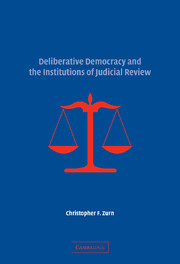Book contents
- Frontmatter
- Contents
- Acknowledgments
- 1 Introduction
- 2 Majoritarian Democracy and Minoritarian Constitutionalism
- 3 From Majoritarian to Deliberative Theories of Constitutional Democracy
- 4 Deliberative Democracy and Substantive Constitutionalism
- 5 Disagreement and the Constitution of Democracy
- 6 The Seducements of Juristic Discourse as Democratic Deliberation
- 7 Constitutionalism as the Procedural Structuring of Deliberative Democracy
- 8 The Institutions of Constitutional Review I: Design Problems and Judicial Review
- 9 The Institutions of Constitutional Review II: Horizontal Dispersal and Vertical Empowerment
- Bibliography
- Index
- Table of Cases
8 - The Institutions of Constitutional Review I: Design Problems and Judicial Review
Published online by Cambridge University Press: 18 July 2009
- Frontmatter
- Contents
- Acknowledgments
- 1 Introduction
- 2 Majoritarian Democracy and Minoritarian Constitutionalism
- 3 From Majoritarian to Deliberative Theories of Constitutional Democracy
- 4 Deliberative Democracy and Substantive Constitutionalism
- 5 Disagreement and the Constitution of Democracy
- 6 The Seducements of Juristic Discourse as Democratic Deliberation
- 7 Constitutionalism as the Procedural Structuring of Deliberative Democracy
- 8 The Institutions of Constitutional Review I: Design Problems and Judicial Review
- 9 The Institutions of Constitutional Review II: Horizontal Dispersal and Vertical Empowerment
- Bibliography
- Index
- Table of Cases
Summary
This chapter and the next are more experimental and speculative than the preceding ones, proposing some institutional transformations for the processes of constitutional review in democratic societies. The proposals no doubt develop out of my own knowledge of and familiarity with the U.S. system of constitutional review – probably unavoidably also including my dissatisfactions with that system – but I do not intend them to be merely provincial in nature. At the very least, I believe the basic conception of deliberative democratic constitutionalism that I have been developing in this book supports the general spirit and aims animating the recommendations, even if the particular recommendations turn out to be problematic or questionable. They are meant, then, more as opening moves in an ongoing deliberative democratic project of constitutional government, rather than definitive conclusions about or claims to the indispensable requirements for constitutional democracy.
THE PROBLEMS OF DESIGNING INSTITUTIONS OF CONSTITUTIONAL REVIEW
Let me now present, in perhaps an overly schematized way, a set of considerations that can move the discussion forward from the ideal to the real, from purely normative considerations to more concrete and complex considerations of institutional design. In the first section I consider tensions between the ideals of deliberative democratic constitutionalism – in particular its conception of the function of constitutional review – and the unavoidable realities of ongoing constitutional elaboration within institutions intended to protect the constitutional structures of deliberative democracy.
- Type
- Chapter
- Information
- Deliberative Democracy and the Institutions of Judicial Review , pp. 253 - 300Publisher: Cambridge University PressPrint publication year: 2007



